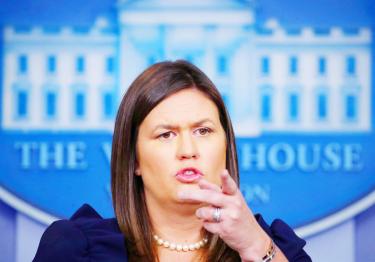The White House late on Thursday cautioned China against luring away Taiwan’s allies, in the latest sign that trade friction between Washington and Beijing is expanding into a broader struggle for global clout.
In a harshly worded statement, White House press secretary Sarah Huckabee Sanders said that the US would rethink relations with El Salvador after the Central American nation this week cut ties with Taipei in favor of Beijing.
The US would seek to deter Chinese efforts to forge new diplomatic bonds in the region, Sanders said.
“The El Salvadoran government’s receptiveness to China’s apparent interference in the domestic politics of a Western Hemisphere country is of grave concern to the United States, and will result in a re-evaluation of our relationship with El Salvador,” she said. “The United States will continue to oppose China’s destabilization of the cross-strait relationship and political interference in the Western Hemisphere.”
While the statement mentioned no specific action, it represented a potentially significant shift in the US’ posture toward China.
The western hemisphere reference evoked the US’ historical claim to a sphere of influence over North and South America under the Monroe Doctrine, which then-US secretary of state John Kerry in 2013 declared “over.”
El Salvador was the third Central American nation to recognize Beijing in two years, leaving Taipei with only 17 diplomatic allies.
The Presidential Office yesterday thanked the US for “speaking out for justice.”
“Taiwan is grateful to the US authorities, including the White House, government and Congress, for the remarks they made in favor of Taiwan” after El Salvador switched recognition to China, Presidential Office spokesperson Alex Huang (黃重諺) said in a statement.
“Protecting the country’s sovereignty and dignity, strengthening our self-defense and safeguarding our free and democratic lifestyle is our bottom line, which is also an internationally recognized value,” Huang quoted President Tsai Ing-wen (蔡英文) as saying. “Taiwan will not yield to China’s intimidation and will continue to contribute to the stabilization and the forces of good in the region.”
Separately, Tsai met with former US Pacific Fleet commander Admiral Scott Swift in Taipei yesterday.
She thanked Swift, the US Congress and US government for their support, and said she hoped for regular arms sales to Taiwan, as well as more exchanges on autonomous defense capabilities.
Maintaining security and stability in the Taiwan Strait and in the region is a goal that the two countries share, Tsai said.
As China’s suppression of Taiwan continues to increase, Taipei should work closely with the US and other nations that have similar beliefs, and play a more active role in regional security, she said.
Apart from boosting military exchanges between the US and Taiwan, Swift’s visit was evidence of the strong partnership between the two nations, Tsai said.
This month, US President Donald Trump signed the US National Defense Authorization Act for fiscal year 2019, she said, adding that the sections pertaining to Taiwan contain benefits that include mutual visits between officials from Taiwan and the US, Taiwan-US military exchanges and the improvement of Taiwan’s military preparedness.
Additional reporting by CNA
Source: Taipei Times - 2018/08/25





















